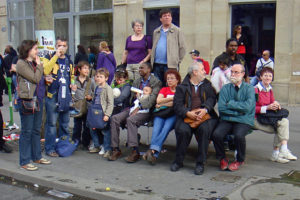James Stevens & Adnan Hadzi are in Athens attending Hybrid City III where co-collaborators in next years MAZI project met together for the first time to hold a workshop at the event, discuss respective projects and get to know one another.
![]() Armin Medosch gave closing keynote speech and just published the supporting document here!
Armin Medosch gave closing keynote speech and just published the supporting document here!
Our work complete, here we are with Adnan, Andreas and Panos before diner at the beach.. !
This weekend YT will present a quick review of Consume.net at the Athens Wireless Metropolitan Network annual conference where members of the group will meet in Athens to celebrate progress and discuss future plans for development, wider inclusion and enhancements.

 Up Periscope! is a printed media campaign to run at street level which presents an opportunity for passers by to investigate AWMN and see the view from the rooftop of each node location eg. Senius 10636. Each poster presents a QRcode for easy linking to the many panoramic images stored on the WIND node database.
Up Periscope! is a printed media campaign to run at street level which presents an opportunity for passers by to investigate AWMN and see the view from the rooftop of each node location eg. Senius 10636. Each poster presents a QRcode for easy linking to the many panoramic images stored on the WIND node database.
 can I see my apartment from here? then there is a good chance of making a link back.
can I see my apartment from here? then there is a good chance of making a link back.
So it is a tool for network builders to help identify viable locations to interlink with the free information infrastructure and promote AWMN. Over 1000 high speed wireless network nodes span Athens and across Greece, linking villages and cities alike.
YT and Adnan last visited Athens during New Babylon in 2014 and set out to introduce reStreet workshop group to the delights of file synchronization with SYNC and Syncthing, QRcodes and button badges.
Our friend Mathias Jud visited us in London “Our visit to London last month finally realizes in an online Video. We have been invited to give a talk at a TED Global event. It was a good experience but also quite demanding with rehearsals, mandatory events and a strange diner at the house of the James Bond producer … and somehow asked not to talk about before the event. However the video has been put online today”, when producing a TED talk on Art that lets you talk back to NSA spies.


